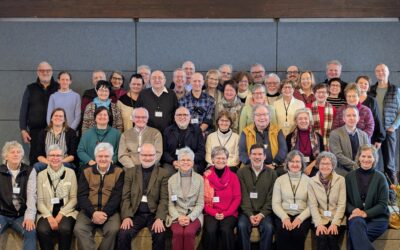The little focolare town in Argentina is celebrating its 50th anniversary. Pat Santoianni, Cecilia Gatti, Adriana Otero and Israele Coelho speak about its contribution to the formation of young people. The little town of O’Higgins in Argentina has just celebrated its fiftieth anniversary. It is one of the twenty-five permanent Mariapoli in the world. Considering that its purpose is the formation of young people, 1968 – a year of great protest and unrest among youth – was a perfect time to begin. The little town seemed to have had a star shining down upon it. Nowadays, O’Higgins is known as Mariapolis Lia. It is named after Lia Brunet who was one of the first people, in the 40’s, who shared Chiara Lubich’s life and ideals. She was courageous and open-minded – a real pioneer in this Focolare town in South America. To date, over 3,500 young people from all over the world have gone to Mariapolis Lia for an “experiencia”; in other words, they have chosen to spend a few months or a maximum of two years in the little town, working, studying and experiencing what it means to live in a multi- cultural environment where the spirituality of unity reigns. After this time, they return to their own homes, enriched by this human and intellectual experience that has opened their hearts and minds to other people and cultures. Pat Santoianni, anthropologist and co-responsible for the Formation at Mariapolis Lia said, “Over the years, we have developed the formation process: one of the chief elements is that the whole social body contributes to formation. Therefore, our course is anthropological and existential and impacts upon life, thought and action.” Adriana Otero, biologist and one of the formation co-ordinators said that the course has a holistic approach. She said, “We try to keep up with both the challenges and risks that young people face in today’s society – relationships, choices, freedom, social and civil commitment, dialogue among different cultures and among different generations and technology. Work is also an important element as, for many young people, this is a new experience.”  Cecilia Gatti, a researcher in education, said that relationships lie at the heart of the educational process. “Education means relationship. This is a concept drawn from the Focolare spirituality of unity that is central to our formation programme. Relationships with other people enable me to build strong bonds, to see my life in a different way, to contribute to and engage with society. Our school is a little town where everything provides an opportunity to learn – every relationship, every dialogue, every meeting.” In an age of technological advances such as Web 4.0, the obvious question is how can O’Higgins, a small village in the middle of the Argentinian pampas, really work as a location for the formation of these young millennials. Israele Coelho, a Brazilian expert in education and co-responsible for the formation course said the experience itself is proof of its validity. “Although this place, in the middle of nowhere, could seem to be a contradiction in terms, it still continues to be an environment where young people can focus upon themselves, experience an interior silence and develop their relationship with God and other people. For many young people, this “experiencia” is an important time for making fundamental choices in life.”
Cecilia Gatti, a researcher in education, said that relationships lie at the heart of the educational process. “Education means relationship. This is a concept drawn from the Focolare spirituality of unity that is central to our formation programme. Relationships with other people enable me to build strong bonds, to see my life in a different way, to contribute to and engage with society. Our school is a little town where everything provides an opportunity to learn – every relationship, every dialogue, every meeting.” In an age of technological advances such as Web 4.0, the obvious question is how can O’Higgins, a small village in the middle of the Argentinian pampas, really work as a location for the formation of these young millennials. Israele Coelho, a Brazilian expert in education and co-responsible for the formation course said the experience itself is proof of its validity. “Although this place, in the middle of nowhere, could seem to be a contradiction in terms, it still continues to be an environment where young people can focus upon themselves, experience an interior silence and develop their relationship with God and other people. For many young people, this “experiencia” is an important time for making fundamental choices in life.”
Stefania Tanesini




0 Comments